Gaza: Surgeon ready to help says moral duty trumps fear
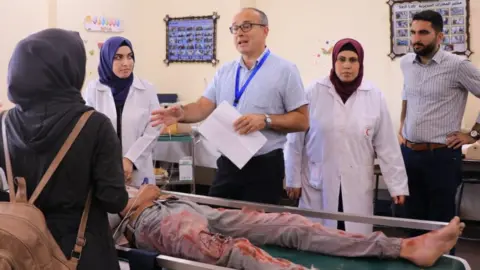 BBC
BBCWith each passing day, groups of volunteer medics in different parts of the world remain on standby to go to Gaza to care for the thousands of injured and sick people who fill hospitals stretched to the extreme. Professor Nick Maynard is one of them.
Nick is a consultant surgeon, based in Oxford, who's been travelling to the Gaza Strip and West Bank for more than a decade.
Since 2010 he has been to Gaza almost every year, usually leading a group of medics who teach students and junior doctors.
In May, he witnessed the conflict first-hand when at least 15 Palestinians, including three commanders of the militant group Islamic Jihad, were killed in Israeli air strikes on the Gaza Strip.
Gaza locked down, and after four days of "non-stop" bombing Nick was evacuated by the UN.
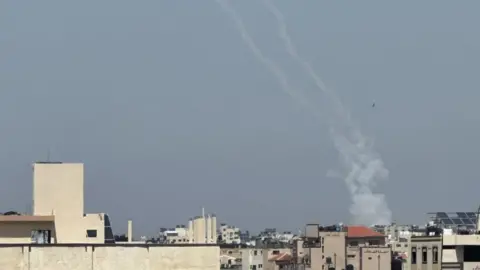 Nick Maynard
Nick MaynardHe is now on standby to go and work in operating theatres with the charity Medical Aid for Palestinians, as soon as it becomes safe to do so amid the conflict between Israel and Hamas.
"A huge sense of duty" is motivating him to want to go and do what he can, and he says he is not alone.
"I think there is fear, apprehension, not knowing what one would find, but I think the other motives for doing so… are so powerful that they outweigh everything else," he says.
"I consider it a huge privilege to be in a position to help these people who need help more than most of us can possibly understand.
"It just feels the right thing to do...I've got many friends over there who I'm very close to. I've got Gazan friends staying with us [now]."
He shares the story of Enas, a young Gazan doctor he trained who he and his wife have become an "adoptive parent" to.
She left Gaza eight years ago after securing a scholarship to study in England but has never been able to return.
As part of Israel's blockade of Gaza, Palestinians are prohibited from entering and leaving except in extremely rare cases, including if people need care for life-threatening conditions or if they are on a limited list of merchants.

More on Israel-Gaza war
- Follow live: Latest updates
- From Gaza: ‘So crowded we can’t even sleep on our backs’: Gaza shelters at breaking point
- From Israel: How much closer is Israel to its goal in Gaza?
- Explained: The faces of hostages taken from Israel
- History behind the story: The Israel-Palestinian conflict

When Enas got married, Nick walked her down the aisle because her family were denied permission to leave Gaza.
She has had little contact with them in recent weeks due to communications blackouts, and goes days without knowing if they are alive or dead.
"They think they'll die," Nick says. "They've all written their names in indelible ink on their arms and their legs so that if they get killed, they'll be identified."
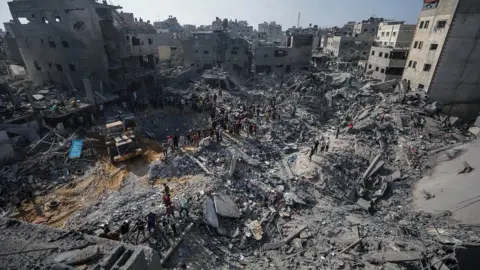 EPA
EPAThe Islamic University of Gaza and Al-Azhar University, where Nick teaches, both sustained "serious damage" in October during bombing, according to the Palestinian Ministry of Higher Education and Scientific Research, which forms part of the Palestinian Authority.
The Israel Defense Forces claimed the Islamic University of Gaza "serves as a central training centre for Hamas engineers" and a "training institution for the development and production of weapons", claims Nick is sceptical of.
"I've visited these buildings on many, many occasions and, more importantly, people I've known for many years and trust implicitly have spent decades in these buildings and [they] do not believe that happens," he says.
"It's inconceivable to me that they could be used as Hamas headquarters without the knowledge of people who work there day in, day out."
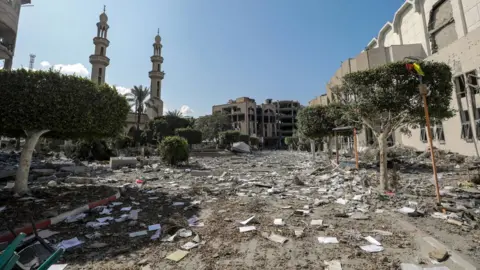 EPA
EPACountries including Turkey, Jordan, and Egypt have been calling for a ceasefire, as well as the United Nations and the leaders of all of its major agencies.
Israeli Prime Minister Benjamin Netanyahu has said there would be no ceasefire without the release of Israeli hostages, but that humanitarian pauses might be possible to let aid into the enclave and hostages out.
US Secretary of State Antony Blinken has also resisted calls for one, saying it would allow Hamas to "regroup and repeat" its 7 October attacks, in which it killed 1,200 Israelis and kidnapped more than 200 others.
Nick insists that in order for Gazan patients to be helped there needs to be a complete ceasefire, "not a temporary pause of 48 hours", as well as the creation of multiple corridors of aid - including from Israel.
"There's no way it can all come in through Rafah," he says, referring to the only crossing point for humanitarian aid on Gaza's southern border with Egypt.
"The main road up and down Gaza has been destroyed... so to transport patients from the north down to Rafah will, I think, be well nigh impossible.
"And many of those patients - if there is still power in the hospitals, which is disappearing - may be on ventilators."
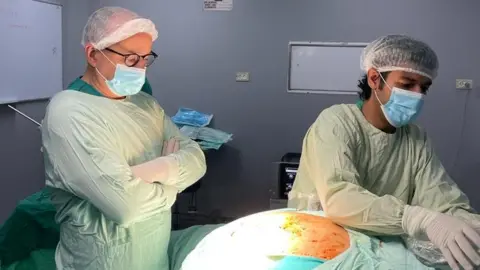
More than 11,000 people have been killed in Gaza according to the Hamas-run health ministry, including more than 4,500 children - but Nick believes those numbers could be just the tip of the iceberg.
"As a result of the bombings there will be large numbers of deaths due to untreated cancers, untreated diabetes," he says.
"Until insulin was invented, diabetes killed everyone. Now, if they haven't got any insulin... diabetes will start killing people.
"If they've got no power, they can't give dialysis, so all patients in kidney failure will die, so that the amount of excess deaths will be huge in the next few months absolutely is a really important point."
The World Health Organization has said a "public health catastrophe" was imminent in Gaza, due to mass displacement, overcrowding, and damage to water and sanitation infrastructure.
These conditions are perfect for the rapid spread of infectious diseases like cholera, Nick adds.
"They're drinking dirty, non-sterile water at the moment. The big danger is that infectious diseases just take control and run through the population...and that will lead to many, many thousands of deaths."
